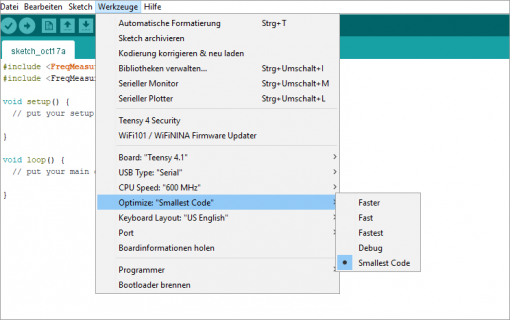00000000 000001d0 T _VectorsFlash
00000022 A _teensy_model_identifier
000001d0 00000200 T ResetHandler
00000400 00000010 T flashconfigbytes
00000410 t __do_global_dtors_aux
00000434 t frame_dummy
0000046c 000000a0 W TeensyStep::MotorControlBase<TimerField>::stepTimerISR()
0000050c 00000018 W TeensyStep::MotorControlBase<TimerField>::pulseTimerISR()
00000524 0000000c W IntervalTimer::~IntervalTimer()
00000524 0000000c W IntervalTimer::~IntervalTimer()
00000530 00000084 W TimerField::delayISR(unsigned int)
000005b4 0000018c W TeensyStep::RotateControlBase<LinRotAccelerator, TimerField>::accTimerISR()
000006aa t L_722_delayMicroseconds
00000740 00000008 T setup
00000748 00000078 T loop
000007c0 00000058 W TeensyStep::MotorControlBase<TimerField>::~MotorControlBase()
000007c0 00000058 W TeensyStep::MotorControlBase<TimerField>::~MotorControlBase()
00000818 00000014 W TeensyStep::RotateControlBase<LinRotAccelerator, TimerField>::~RotateControlBase()
00000818 00000014 W TeensyStep::RotateControlBase<LinRotAccelerator, TimerField>::~RotateControlBase()
0000082c 0000001c W TeensyStep::RotateControlBase<LinRotAccelerator, TimerField>::~RotateControlBase()
00000848 00000014 W TeensyStep::MotorControlBase<TimerField>::~MotorControlBase()
0000085c 00000154 t _GLOBAL__sub_I__Z10signed_sqrf
000009b0 0000006c T TeensyStep::Stepper::Stepper(int, int)
000009b0 0000006c T TeensyStep::Stepper::Stepper(int, int)
00000a1c 00000030 T TeensyStepFTM::removeDelayChannel(unsigned int)
00000a4c 00000044 T ftm0_isr
00000a90 0000001c T usb_serial_available
00000aac 00000048 T usb_serial_flush_callback
00000af4 00000048 W bus_fault_isr
00000af4 00000048 T fault_isr
00000af4 00000048 W hard_fault_isr
00000af4 00000048 W memmanage_fault_isr
00000af4 00000048 W usage_fault_isr
00000b3c 00000006 W adc0_isr
00000b3c 00000006 W adc1_isr
00000b3c 00000006 W can0_bus_off_isr
00000b3c 00000006 W can0_error_isr
00000b3c 00000006 W can0_message_isr
00000b3c 00000006 W can0_rx_warn_isr
00000b3c 00000006 W can0_tx_warn_isr
00000b3c 00000006 W can0_wakeup_isr
00000b3c 00000006 W can1_bus_off_isr
00000b3c 00000006 W can1_error_isr
00000b3c 00000006 W can1_message_isr
00000b3c 00000006 W can1_rx_warn_isr
00000b3c 00000006 W can1_tx_warn_isr
00000b3c 00000006 W can1_wakeup_isr
00000b3c 00000006 W cmp0_isr
00000b3c 00000006 W cmp1_isr
00000b3c 00000006 W cmp2_isr
00000b3c 00000006 W cmp3_isr
00000b3c 00000006 W cmt_isr
00000b3c 00000006 W dac0_isr
00000b3c 00000006 W dac1_isr
00000b3c 00000006 W debugmonitor_isr
00000b3c 00000006 W dma_ch0_isr
00000b3c 00000006 W dma_ch1_isr
00000b3c 00000006 W dma_ch10_isr
00000b3c 00000006 W dma_ch11_isr
00000b3c 00000006 W dma_ch12_isr
00000b3c 00000006 W dma_ch13_isr
00000b3c 00000006 W dma_ch14_isr
00000b3c 00000006 W dma_ch15_isr
00000b3c 00000006 W dma_ch2_isr
00000b3c 00000006 W dma_ch3_isr
00000b3c 00000006 W dma_ch4_isr
00000b3c 00000006 W dma_ch5_isr
00000b3c 00000006 W dma_ch6_isr
00000b3c 00000006 W dma_ch7_isr
00000b3c 00000006 W dma_ch8_isr
00000b3c 00000006 W dma_ch9_isr
00000b3c 00000006 W dma_error_isr
00000b3c 00000006 W enet_error_isr
00000b3c 00000006 W enet_rx_isr
00000b3c 00000006 W enet_timer_isr
00000b3c 00000006 W enet_tx_isr
00000b3c 00000006 W flash_cmd_isr
00000b3c 00000006 W flash_error_isr
00000b3c 00000006 W ftm1_isr
00000b3c 00000006 W ftm2_isr
00000b3c 00000006 W ftm3_isr
00000b3c 00000006 W i2c0_isr
00000b3c 00000006 W i2c1_isr
00000b3c 00000006 W i2c2_isr
00000b3c 00000006 W i2c3_isr
00000b3c 00000006 W i2s0_isr
00000b3c 00000006 W i2s0_rx_isr
00000b3c 00000006 W i2s0_tx_isr
00000b3c 00000006 W low_voltage_isr
00000b3c 00000006 W lptmr_isr
00000b3c 00000006 W lpuart0_status_isr
00000b3c 00000006 W mcg_isr
00000b3c 00000006 W mcm_isr
00000b3c 00000006 W nmi_isr
00000b3c 00000006 W pdb_isr
00000b3c 00000006 W pit_isr
00000b3c 00000006 W porta_isr
00000b3c 00000006 W portb_isr
00000b3c 00000006 W portc_isr
00000b3c 00000006 W portcd_isr
00000b3c 00000006 W portd_isr
00000b3c 00000006 W porte_isr
00000b3c 00000006 W randnum_isr
00000b3c 00000006 W rtc_alarm_isr
00000b3c 00000006 W rtc_seconds_isr
00000b3c 00000006 W sdhc_isr
00000b3c 00000006 W software_isr
00000b3c 00000006 W spi0_isr
00000b3c 00000006 W spi1_isr
00000b3c 00000006 W spi2_isr
00000b3c 00000006 W svcall_isr
00000b3c 00000006 W tpm0_isr
00000b3c 00000006 W tpm1_isr
00000b3c 00000006 W tpm2_isr
00000b3c 00000006 W tsi0_isr
00000b3c 00000006 W uart0_error_isr
00000b3c 00000006 W uart0_lon_isr
00000b3c 00000006 W uart0_status_isr
00000b3c 00000006 W uart1_error_isr
00000b3c 00000006 W uart1_status_isr
00000b3c 00000006 W uart2_error_isr
00000b3c 00000006 W uart2_status_isr
00000b3c 00000006 W uart3_error_isr
00000b3c 00000006 W uart3_status_isr
00000b3c 00000006 W uart4_error_isr
00000b3c 00000006 W uart4_status_isr
00000b3c 00000006 W uart5_error_isr
00000b3c 00000006 W uart5_status_isr
00000b3c 00000006 T unused_isr
00000b3c 00000006 W usb_charge_isr
00000b3c 00000006 W usbhs_isr
00000b3c 00000006 W usbhs_phy_isr
00000b3c 00000006 W wakeup_isr
00000b3c 00000006 W watchdog_isr
00000b44 0000000c t startup_default_early_hook
00000b44 0000000c W startup_early_hook
00000b50 00000002 t startup_default_late_hook
00000b50 00000002 W startup_late_hook
00000b54 0000002c T _sbrk
00000b80 00000002 W __cxa_pure_virtual
00000b84 00000034 T kinetis_hsrun_disable
00000bb8 00000034 T kinetis_hsrun_enable
00000bec 00000078 t pinMode.part.2
00000c64 00000024 T rtc_set
00000c88 00000002 t startup_default_middle_hook
00000c88 00000002 W startup_middle_hook
00000c8c 0000000a T pinMode
00000c98 000000a4 T delay
00000d3c 00000170 T _init_Teensyduino_internal_
00000eac 00000040 T usb_malloc
00000eec 0000004c T usb_free
00000f38 00000084 T usb_rx_memory
00000fbc 00000084 T usb_tx
00001040 00000874 T usb_isr
000018b4 000000c4 T usb_init
00001978 00000002 t dummy_funct()
0000197c 00000044 T IntervalTimer::end()
000019c0 00000014 T pit0_isr
000019d4 00000014 T pit1_isr
000019e8 00000014 T pit2_isr
000019fc 00000014 T pit3_isr
00001a10 000000ec W yield
00001afc 00000044 T EventResponder::runFromInterrupt()
00001b40 00000004 T pendablesrvreq_isr
....


